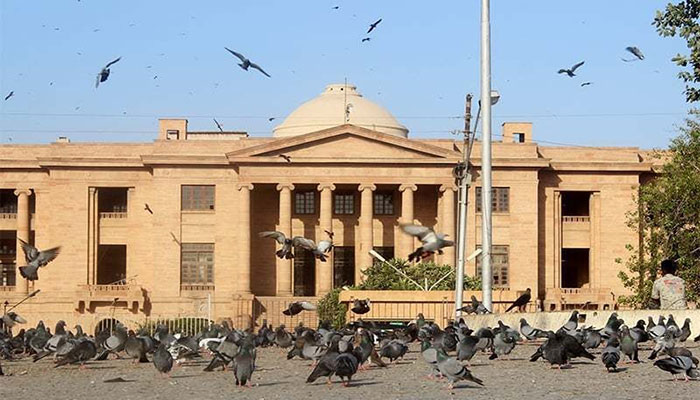SHC wants medical board to ascertain if injured doctor needs treatment abroad
The Sindh High Court (SHC) has directed the provincial health secretary to constitute a medical board of experts to ascertain whether medical treatment of a Hindu psychiatrist, who was allegedly injured by police in Hyderabad and his leg had to be amputated, could be possible in the country or not.
The directives came on a petition seeking medical treatment of Dr Deepak Raj as well as action against police for injuring and disabling the doctor in a fake encounter. The petitioner, Suneeta, submitted that her husband was a psychiatrist and ran a private clinic in Karachi. He went to Hyderabad on April 10, 2015 to meet his friend where police injured him in a fake encounter, declaring him as Sharif Panhwar, a bandit.
She submitted that when she approached police and provided them with information about her husband, they insisted that he was a robber and was injured in a police encounter in Hyderabad. They refused to accept the identity card of her husband and threatened her with dire consequences in case she continued with her efforts to prove her husband innocent.
She requested the high court to take action against Hyderabad SSP Irfan Baloch and other police officials and direct the government to compensate her husband and provide medical treatment to him. The high court had earlier ordered the medical treatment of the doctor on state expenses.
Dr Raj submitted that he had undergone six major surgeries but all such operations had failed. He submitted that he had been advised for undergoing medical treatment abroad and requested the high court to issue necessary directions in this regard.
A division bench of the SHC headed by Justice Naimatullah Phulpoto directed the health secretary to constitute a medical board of experts to examine the victim and submit an opinion on whether the patient could be medically treated in Pakistan or not.
The bench also directed the amicus curiae to appear before the court on March 25 for assistance. It is pertinent to mention that the SHC had observed that the law enforcement agencies’ authority to arrest criminals could never be used as a licence to take the law into hands and nor officers of such agencies could act as judge and executor. The high court observed that it was the responsibility of the state to provide medical aid to the petitioner’s spouse who needed medical treatment due to police action.
-
 Benny Blanco Explains Why His Feet Were Dirty During Podcast Debut
Benny Blanco Explains Why His Feet Were Dirty During Podcast Debut -
 Jake Humphrey Shares The Powerful Meaning Behind His Wrist Tattoo
Jake Humphrey Shares The Powerful Meaning Behind His Wrist Tattoo -
 Matthew Lillard Weighs In On His Return To The 'Scream' Franchise After Decades Of Persistence
Matthew Lillard Weighs In On His Return To The 'Scream' Franchise After Decades Of Persistence -
 Travis, Jason Kelce Share Blunt Dating Advice For Men: 'She's Gonna Hate You'
Travis, Jason Kelce Share Blunt Dating Advice For Men: 'She's Gonna Hate You' -
 Australia To Launch First High-speed Bullet Train After 50-years Delay
Australia To Launch First High-speed Bullet Train After 50-years Delay -
 Meghan Markle Turns To Desperate Bids & Her Kids Are Her ‘saving Grace’: Here’s What They’ll Do
Meghan Markle Turns To Desperate Bids & Her Kids Are Her ‘saving Grace’: Here’s What They’ll Do -
 King Charles Gives A Nod To Sister Anne's Latest Royal Visit
King Charles Gives A Nod To Sister Anne's Latest Royal Visit -
 Christian Bale Shares Rare Views On Celebrity Culture Urging Fans Not To Meet Him In Person
Christian Bale Shares Rare Views On Celebrity Culture Urging Fans Not To Meet Him In Person -
 Ariana Grande To Skip Actor Awards Despite Major Nomination
Ariana Grande To Skip Actor Awards Despite Major Nomination -
 North Carolina Teen Accused Of Killing Sister, Injuring Brother In Deadly Attack
North Carolina Teen Accused Of Killing Sister, Injuring Brother In Deadly Attack -
 Ryan Gosling Releases Witty 'Project Hail Mary' Ad With Sweet Reference To Eva Mendes
Ryan Gosling Releases Witty 'Project Hail Mary' Ad With Sweet Reference To Eva Mendes -
 Teyana Taylor Reveals What Lured Her Back To Music After Earning Fame In Acting Industry
Teyana Taylor Reveals What Lured Her Back To Music After Earning Fame In Acting Industry -
 Prince William Shows He's Ready To Lead The Monarchy Amid Andrew Scandal
Prince William Shows He's Ready To Lead The Monarchy Amid Andrew Scandal -
 Lux Pascal Gushes Over Role In Tom Ford's 'Cry To Heaven': 'I Just Wanted To Be Part Of This Picture'
Lux Pascal Gushes Over Role In Tom Ford's 'Cry To Heaven': 'I Just Wanted To Be Part Of This Picture' -
 Near-blind Refugee Found Dead In Buffalo After Release By US Border Patrol
Near-blind Refugee Found Dead In Buffalo After Release By US Border Patrol -
 Firm Steps In Forcing Andrew’s Hand: ‘Can No Longer Keep A Promise'
Firm Steps In Forcing Andrew’s Hand: ‘Can No Longer Keep A Promise'




